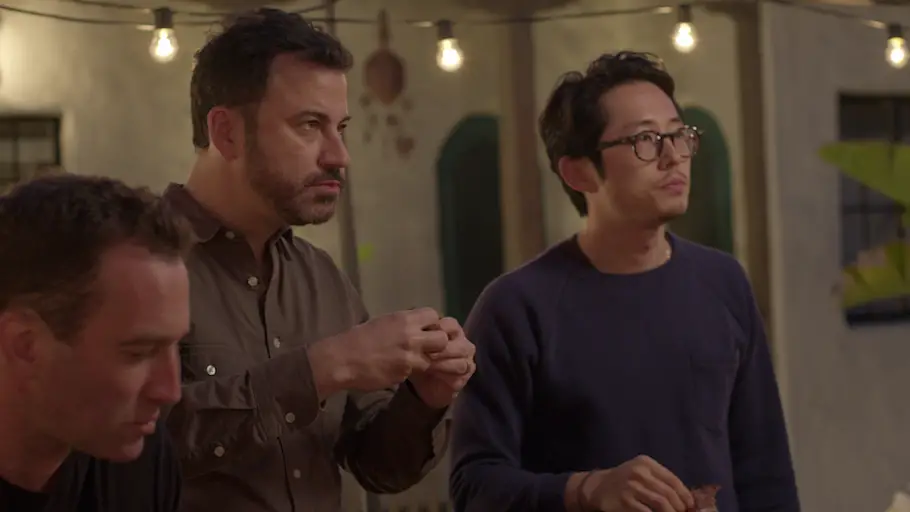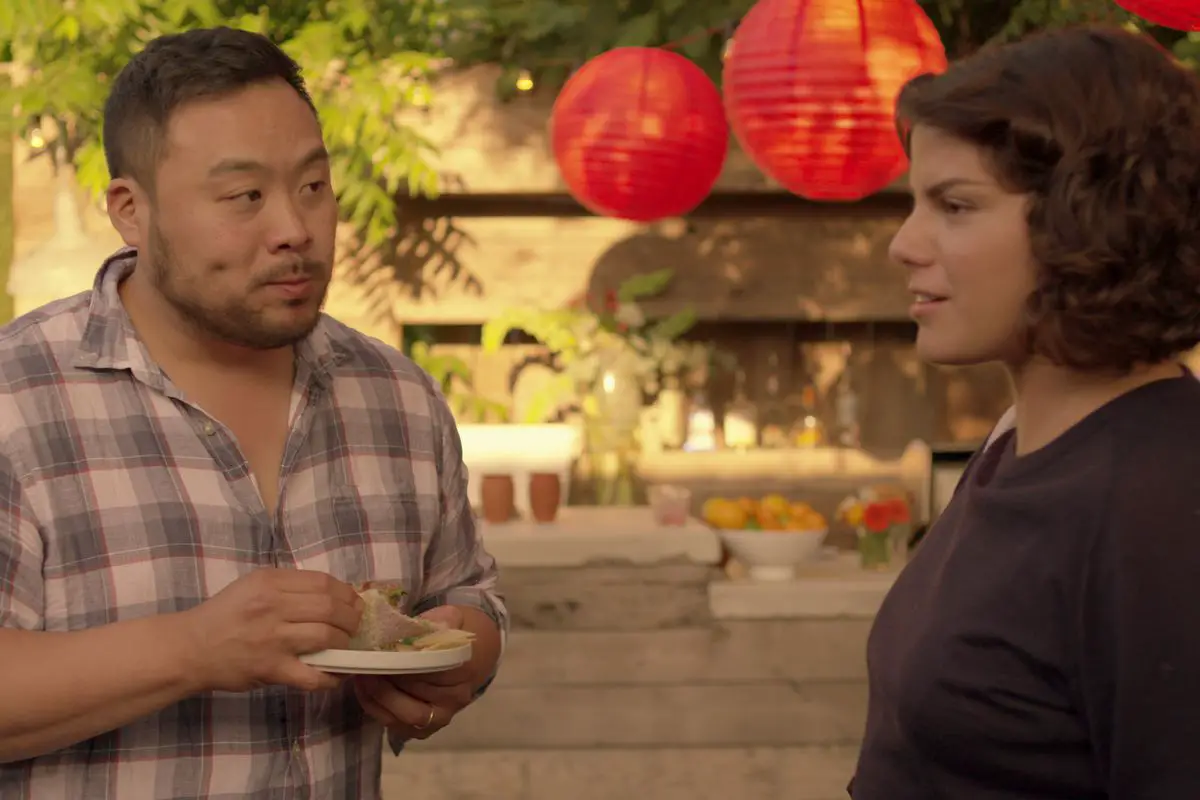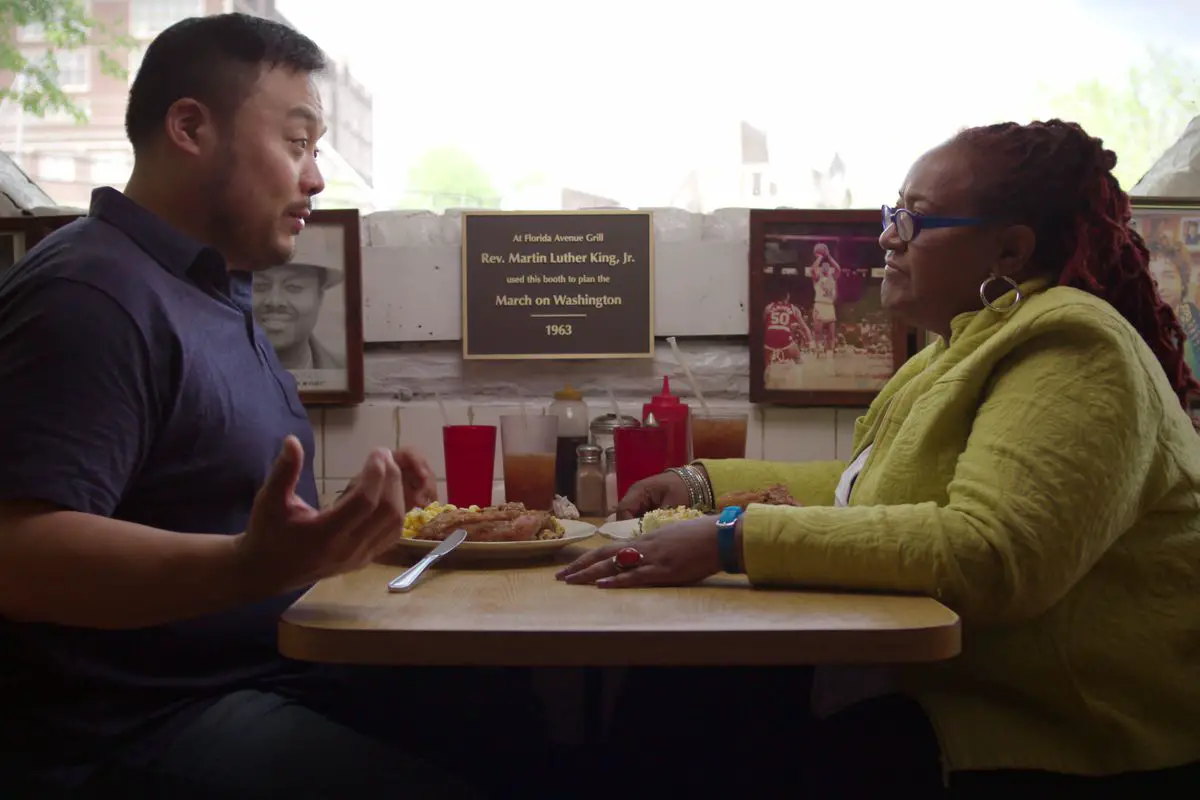In “Ugly Delicious,” the new eight-part food series centered around the globetrotting travails of David Chang, the Momofuku founder sticks with the formula that’s made him into a culinary icon: He’s brash, iconoclastic, deeply self-critical and apparently friends with every chef on the planet.
The show, which features a cast of rotating characters but relies most heavily on Chang and food writer Peter Meehan, feels like the production of a figure who no longer feels the need to introduce himself. The structure is loose — every episode explores a theme, such as barbecue, fried rice or home cooking — and can at times feel like little more than Chang and a group of gastronomic intelligentsia holding court on the merits and demerits of different fare-related topics.
For those unfamiliar with the chef, the series might feel a little too personality driven. Who is David Chang and why do his opinions matter so much? Even the talking heads he features on the show, though most are generally quite qualified, are clearly his friends, which can make the show feel cliquish at times, a characteristic that is, on its face, at odds with any objective pursuit of fact.
However, by this point, not only is most of the food world intimately familiar with Chang, but he — with Meehan at his side — has created one of the most endearing cults of personality in the food industry.
In addition to his success as a cook and restaurateur, Chang also created Lucky Peach, a now-defunct food quarterly that at times feels like the creative progenitor of “Ugly Delicious.” He’s also played a large role in several other projects, such as the acclaimed “Mind of a Chef,” all of which have helped cement his place within the pantheon of the highly opinionated, well-connected international boy’s club of modern culinary fame.
“Ugly Delicious,” then, starts in medias res, almost assuming that the viewer is already a David-Chang fan boy, as it provides no ostensible agenda and only once, fleetingly, explains the show’s name.
(This was a particular bugaboo of mine, as his Instagram account has recently featured the hashtag #UglyDelicious prominently to describe his maturation as a cook, moving from refined and cerebral fare to, as he puts it in the show, “food that nourishes.” I was disappointed that he chose not to explore the concept more, as it works as an apt metaphor for his evolving sensibilities as a cook and human. More on that later.)
The premise, though, is a smart one, because David Chang being David Chang is exactly why most viewers will have tuned in to the series. If you’re a fan of his ethos, one that prides itself egalitarianism — a surprisingly rare philosophy in an industry built on the backs of the underpaid and marginalized — then you’ll have a blast watching him take on the shibboleths of the food industry.
Here, then, are five takeaways from the series.

1. David Chang, Asia’s Best Bulldog
In nearly every episode, Chang studies a revered American foodstuff — pizza, tacos, barbecue — and says something along the lines of, “You know they have this in Asia too, right?”
Time and again, to an extent that even Meehan mocks him for, Chang stands up for the culinary heritage of Asia, whether it’s Korea, Japan, China or any other country in the region. When eating tacos, he thinks of dim sum. He claims that the best pizza is made in Tokyo. Bulgogi, to him, is just as much barbecue as a rack of ribs. Xiao long bao is better than tortellini.
To his credit, he rarely seems wrong. And it’s important to note that doesn’t do what he does in an effort to denigrate the original, mostly Western foods; he’s just intent on giving cuisines of the Orient the respect they’ve long lacked in the Occident.
His insistence on making these comparisons every time might feel overbearing, but it’s because the point is close to his heart. Americans have an ethnocentrism inlaid deeply into their psyche, a phenomenon he explores poignantly in an MSG-related aside, and to root out that sense of entitlement Chang makes a point of confronting it every time it surfaces. It just so happens that it surfaces a lot.
2. The Scale of Production
Key to the show feeling a little loose structurally is the fact that it was filmed in multiple locations across the world and over the course of several years’ time.
Neither of these considerations worsens the show, but the timeline can make parts of it feel a little anachronistic. For instance, several scenes appear to have been filmed around late 2016, right as Donald Trump was being elected president.
In one scene in particular, when discussing being black in Japan, Chang asks a wife and husband duo whether they make the distinction to their Japanese patrons that they are African American, rather than African or Afro-Caribbean. They laugh, insisting that, at the moment, they are trying to play down the fact that they are American at all.
In another curious scene, Chang is eating fried chicken with renowned chef Sean Brock. Brock, who famously announced last year that he was taking a leave of absence from his restaurant empire to deal with his alcoholism, had not, at the time of the shooting, decided to deal with his addiction. While they don’t drink on camera, Brock’s cheeks are flushed deeply crimson, a characteristic that has come to be a telltale sign that he’s been drinking.
Both scenes return the viewer to a period of time since passed, and in doing so act as either a fun time capsule or an unintended method of dating the filming, depending on your opinion.
3. Race: Yes? Gender: No
The show makes a valiant effort to explore the insidious effects of racism in the food industry, and the exploration feels fresh, as it’s headed by a Korean American who routinely turns over the topic with an ethnically diverse cast of commentators.
While “Ugly Delicious” did take criticism for its somewhat skinny allotment of screen time to black cooks — it devoted an episode to fried chicken’s perfidious racial baggage, but African Americans were largely missing outside the episode dedicated to Southern food — the series went deep into questions of authenticity, cultural assimilation and systemic racism within the food industry, and should be applauded for such.
However, it glaringly overlooked 50 percent of the population. The nods of the cap to women in the kitchen felt obligatory — “No one cooks like your mom can,” “Women have always traditionally done the cooking” — but compared to the fastidious exploration of race, they felt half-baked.
The show did follow Rosio Sanchez, the proprietor of Hija de Sanchez, during its taco episode, but it made sure to emphasize that she was the star pupil of Rene Redzepi.

As the New York Times’ Mike Hale notes, screen time tells the tale:
“An episode about home cooking is the only one with an equal representation of women and men among the significant speaking roles. In all the others men outnumber women by 2 or 3 to 1; in the pizza episode it’s 8 to 1. This may reflect the state of affairs in the food industry, but it’s surprising for a series that wants to talk about diversity and representation.”
Kudos to Chang for making uncomfortable discussions of race an integral component of the show, but the show’s lack of female representation is a little bewildering, especially in light of how intently its scrutinizes imbalanced power dynamics.
4. Why Fuschia Dunlop?
I know that Chang prefers to feature familiar faces, but am I the only one who feels weirded out about Fuschia Dunlop’s hegemony as the expert on Chinese cuisine? I’m sure she’s had to field criticisms like mine before, and I’m sure she has a CV that would drop my jaw, but surely there has to be, I don’t know, a Chinese person who might step in to challenge her position of dominance?
There just seems something vaguely paternalistic (maternalistic?) about having a, as Nakia from “Black Panther” would put it, colonizer explaining Chinese food for them? In other words, is the leading source on Chinese food really a British woman?
5. The Big Gnarly Personal Themes
I see two, one of which was clearly intentional. Chang is obsessed with authenticity. He looks at the concept every which way, in a fashion similar to someone trying to figure out a Rubik’s Cube by turning it over in their hands. The idea clearly frustrates, mystifies and motivates him all at once.
Chang himself has wrestled with authenticity in his own food, and his obsession with the idea seems to stem from an internal battle over his identity, a hypothesis he alludes to in the series. He asks when novelty becomes tradition, who gets to decide what authentic means and whether the concept stifles creativity (spoiler: he thinks it does).
In cuisine, where the collective conscience seems to date back only about two generations, authenticity is less of an objective fact and more of a tool of exclusion. Things that people “have always done” have, in fact, many times, only been around for a few decades. But by declaring a right and a wrong way to go about preparing food, privileged insiders have found a way to prop up an unimpeachable barrier to keep others out. Chang, as an avid decrier of all things snobby, is on a personal mission to put authenticity in its proper place; it has one, rest assured, but it shouldn’t be nearly as vaunted as it is.
The second theme, which flits in the background but is rarely directly addressed, is the maturation of Chang as a cook. The concept of #UglyDelicious, which refers to food that eschews sex appeal for nourishment, that ignores boundary-pushing for connection-making, is at the heart of the series, and it’s at the heart of Chang.
As he himself points out, Chang rose to prominence with flash in a pan and dazzling creativity. Combined with his bravado, his push for novelty encapsulated everything diners wanted from their celebrity chefs in the late aughts.
As he’s grown older though, his cooking has become less about wowing the diner and more about making a dish that resonates on a level deeper than taste. Chang got married last year, and he looks enviously at Redzepi’s family when they cook together at his house. He talks about how he could never start Momofuku now because he has too much to lose. He looks at his fleet of restaurants and seems to wonder whether he’s made the right choice in his decision to become a global empire.
On its face, “Ugly Delicious” is another chapter in the legacy of the foul-mouthed, sacred-cow slaughtering chef that the world loves to hear rant. Below the surface, though, is a chef on the verge of reaching his Ozymandias moment.
What exactly is so important about his food? How can he use it to make a lasting, and bettering impact on the world? What does he really want his legacy to be? “Ugly Delicious” may be a great chronicle of the state of the culinary industry, but it also marks a pivotal moment in the life of its pro1tagonist. In his search for authenticity and identity, the chef is finally starting to ask questions that aren’t about food.
















